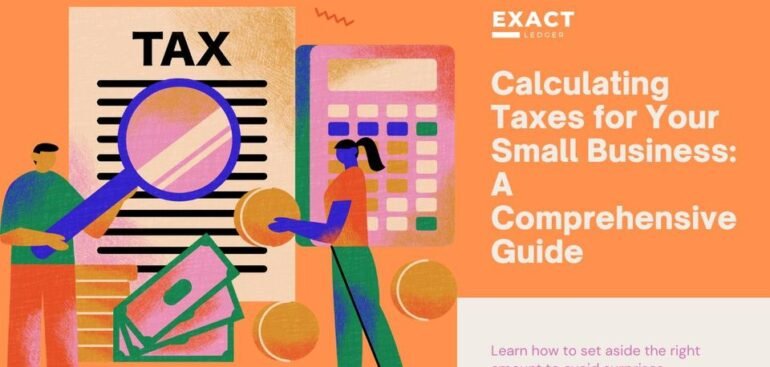Introduction to Tax Planning for Small Businesses
As a small business owner understanding how much should I set aside for business taxes is crucial for your financial health. Proper tax planning can help you avoid penalties manage cash flow and maximize savings. In this guide we will explore the factors that determine how much a small business should put aside for taxes providing you with the insights needed to make informed financial decisions.
1. Understanding Your Tax Obligations
The first step in determining how much should I set aside for business taxes is to understand your tax obligations. These obligations can include federal state and local taxes as well as payroll taxes if you have employees. Familiarize yourself with the tax rates and deadlines that apply to your business to ensure compliance and accurate budgeting.
2. Estimating Your Annual Income
Your annual income plays a significant role in calculating how much should I set aside for business taxes. Review your previous year’s earnings and consider any changes that might affect your income such as new contracts increased sales or business expansion. Accurate income estimation is essential for setting aside the right amount for taxes.
3. Calculating Your Tax Rate
To determine how much should I set aside for business taxes calculate your effective tax rate. This rate is the percentage of your income that you will owe in taxes. Federal tax rates for small businesses vary based on income levels and business structure. State and local tax rates also vary so consider these when calculating your overall tax rate.
4. Factoring in Deductions and Credits
Deductions and credits can significantly impact how much should I set aside for business taxes. Business expenses such as operating costs, equipment purchases and employee salaries can reduce your taxable income. Additionally tax credits for things like research and development or energy-efficient improvements can lower your tax liability. Be sure to account for these when estimating your tax payments.
5. Setting Aside Funds Monthly
To ensure you have enough money to cover your tax bill consider setting aside funds monthly. How much should I set aside for business taxes approach helps spread the financial burden throughout the year and prevents a large unexpected tax bill. Determine how much a small business should set aside for taxes each month by dividing your estimated annual tax liability by 12.
6. Utilizing Tax Software and Professionals
Using tax software or consulting with a tax professional can help you accurately determine how much should i set aside for business taxes. These resources can provide you with tools and advice tailored to your specific business needs ensuring compliance and optimizing your tax savings.
7. Planning for Quarterly Tax Payments
Small businesses often need to make quarterly estimated tax payments to avoid penalties. Calculate how much a small business should put aside for taxes each quarter by estimating your annual tax liability and dividing it by four. Making timely quarterly payments helps manage cash flow and keeps you on track with your tax obligations.
8. Keeping Accurate Financial Records
Accurate financial records are essential for determining how much a small business should set aside for taxes. Maintain detailed records of your income expenses and any deductions or credits you plan to claim. Proper record-keeping not only simplifies tax calculations but also ensures you are prepared in case of an audit.
9. Adjusting Your Tax Savings Plan Annually
Review and adjust your tax savings plan annually to ensure how much should i set aside for business taxes. Changes in income expenses tax laws and business operations can all impact how much a small business should put aside for taxes. Regularly updating your plan helps you stay on top of your tax obligations and avoid surprises.
Introducing ExactLedgers as Your Tax Partner
To further simplify your tax planning and ensure you’re always on top of your tax obligations consider partnering with ExactLedgers. ExactLedgers is dedicated to helping small business owners like you navigate the complexities of tax planning and compliance. With their expert guidance you can accurately determine how much to set aside for taxes, maximize your deductions and avoid costly penalties.
Their team of experienced tax professionals offers personalized support and cutting-edge tools to streamline your financial management. By working with ExactLedgers you can focus on growing your business while they handle the intricacies of tax planning and compliance.
ExactLedgers | Your Companion for Tax Services
ExactLedgers is not just your tax partner but your comprehensive companion for all tax services. They offer a wide range of services including tax preparation tax planning and ongoing tax support tailored to meet the unique needs of your small business. With ExactLedgers by your side you can ensure that every aspect of your tax obligations is managed efficiently and effectively.
Conclusion
Strategic tax planning is essential for small businesses seeking financial stability and growth. By understanding your tax obligations, estimating income, calculating tax rates utilizing deductions and credits and setting aside monthly tax reserves you can effectively manage your tax liabilities. Leverage tax software or professional services plan for quarterly payments, maintain accurate records and review your tax strategy annually to optimize financial outcomes and achieve business success.
FAQ’s
- How much should i set aside for business taxes?
A small business should typically set aside 25-30% of its income for taxes but this can vary based on specific tax obligations.
- What are quarterly tax payments?
Quarterly tax payments are estimated tax payments made four times a year to cover income self-employment and other taxes.
- Can deductions and credits lower my tax liability?
Yes, deductions and credits can significantly lower your taxable income and overall tax liability.
- Is it necessary to use tax software or consult a professional?
While not necessary using tax software or consulting a professional can ensure accurate calculations and compliance.
- How often should I review my tax savings plan?
It’s advisable to review and adjust your tax savings plan annually to account for changes in income expenses and tax laws.



